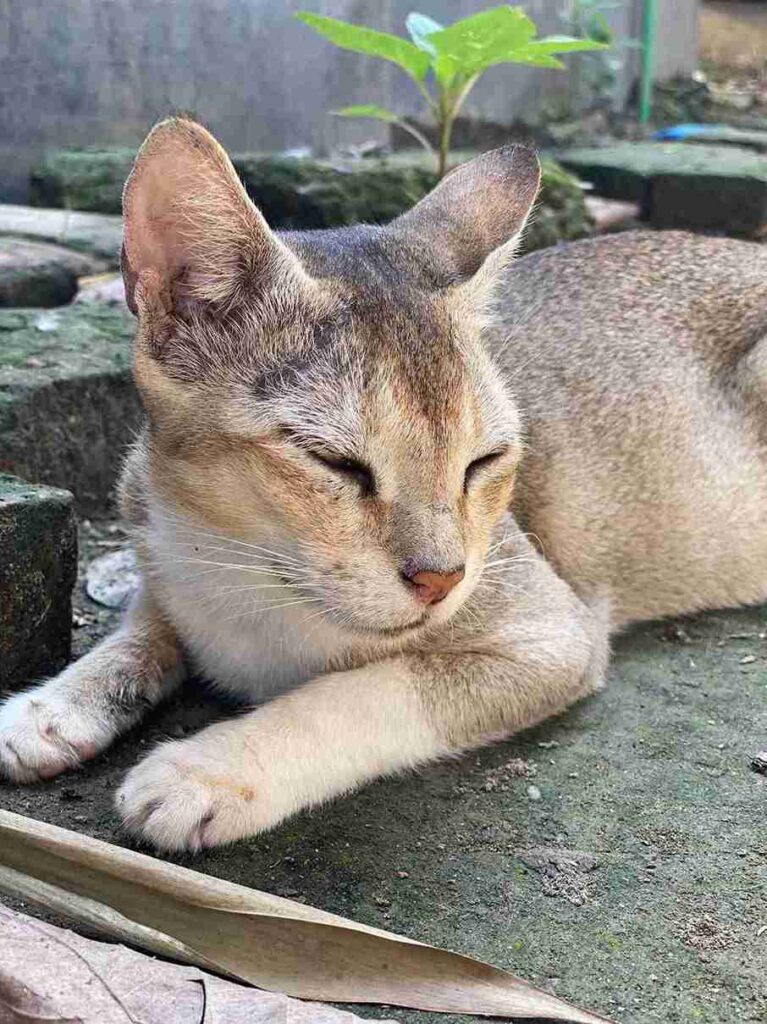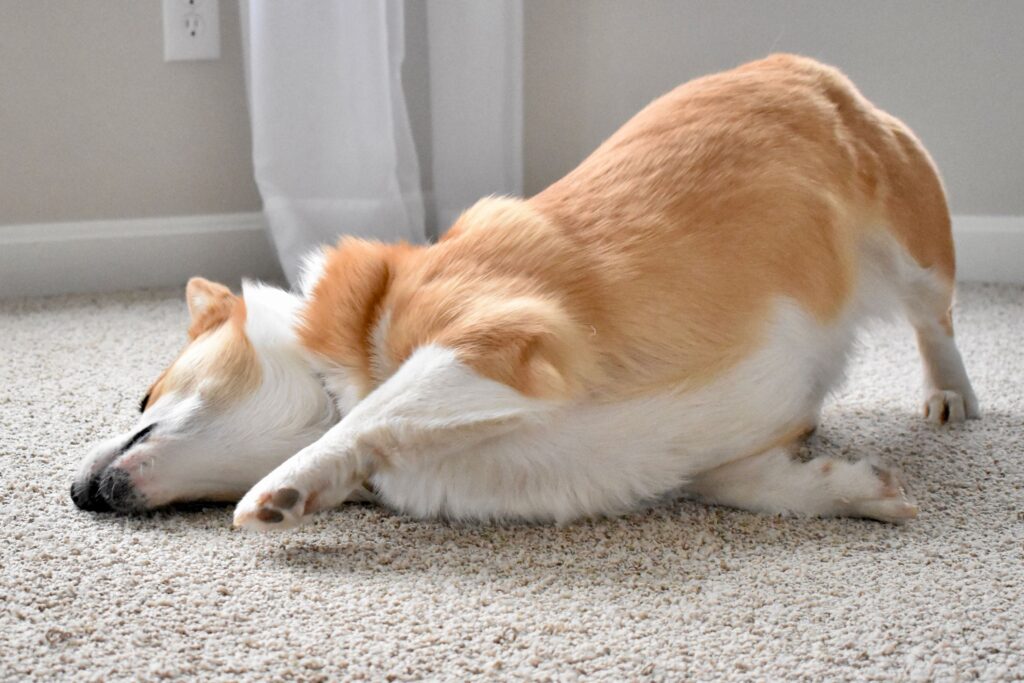Cats lick blankets due to their natural grooming behavior and the soothing texture, which can be harmless or indicate anxiety or health issues. Blanket licking is a common behavior in cats known as self-grooming, where they lick themselves or objects.
Cats find the texture of blankets comforting and may use licking as a way to self-soothe and relax. It can be harmless and provide a sense of security for them. However, excessive blanket licking may indicate underlying stress or anxiety in cats, such as separation anxiety or environmental changes.
It can also be a sign of an underlying medical issue, like dental problems or gastrointestinal distress. Therefore, it’s important to observe your cat’s behavior and consult a veterinarian if you notice any concerning changes in their blanket licking habits.
Contents
- 1 Understanding Feline Behavior
- 2 Exploring The Pleasure Sensation
- 3 Potential Health Concerns
- 4 Addressing Harmful Habits
- 5 Creating A Safe And Stimulating Environment
- 6 Cat Care: Veterinarians’ Insights
- 7 Frequently Asked Questions Of Why Do Cats Lick Blankets? Harmless Fun Or Harmful Habit?
- 8 Conclusion
Understanding Feline Behavior
Understanding Feline Behavior
The Intricate World of Cat Behavior
Cats are known for their peculiar behaviors, and one such behavior is licking blankets. While it may seem harmless at first, understanding this behavior is crucial in deciphering how cats communicate. Licking is a part of cats’ grooming repertoire and serves various purposes. Through licking, cats establish social bonds with other cats or humans, as it mimics the grooming behavior seen between mother cats and their kittens. Cats may also lick blankets to mark their territory and leave their scent. Additionally, stress or anxiety can prompt cats to engage in excessive licking. While the act of licking blankets may seem harmless, it can lead to the ingestion of harmful fibers or chemicals if the blanket is not cat-safe. It is important for cat owners to provide alternative outlets for their cats’ grooming needs by offering appropriate toys and scratching posts. Understanding the reasons behind cats’ behavior, including their peculiar habit of licking blankets, helps us create a safe and enriching environment for our feline friends.
:max_bytes(150000):strip_icc()/why-do-cats-suck-on-blankets-498071365-1-2000-01d32d2aa3104667a006b423a8e8b938.jpg)
Credit: www.dailypaws.com
Exploring The Pleasure Sensation
Cats are known for their grooming habits, but why do they sometimes take it a step further and lick blankets? This behavior may seem harmless, but it can actually serve a deeper purpose. Natural instincts play a significant role in a cat’s grooming behavior, and licking is a way for them to maintain hygiene and remove any unwanted odors.
However, when a cat licks a blanket, it can also trigger a pleasure response. Just like humans, cats have sensitive nerve endings on their tongues that can release endorphins when stimulated. This sensation produces a feeling of pleasure and relaxation, which may explain why cats find licking blankets enjoyable.
While this behavior is generally harmless, it can become a harmful habit if it escalates. Cats may develop an obsessive-compulsive disorder known as “wool sucking,” where they chew and ingest fabric. This can lead to intestinal blockages or ingestion of harmful fibers.
If your cat exhibits excessive licking or demonstrates signs of wool sucking, it’s important to consult a veterinarian. They can help determine the underlying cause and provide appropriate treatment or behavior modification techniques to ensure your cat’s well-being.
Potential Health Concerns
Excessive licking in cats can be a cause for concern, as it may indicate underlying health issues. One common health issue associated with compulsive licking is dermatitis, where the constant licking irritates the skin, leading to inflammation and potential infections. Another potential consequence of excessive licking is the formation of hairballs in the cat’s digestive tract, which can cause discomfort, vomiting, and even intestinal blockages.
Moreover, constant licking can also result in the ingestion of a substantial amount of fur, which may lead to the development of gastrointestinal obstructions. These obstructions can require surgical intervention and pose serious risks to the cat’s overall health.
Furthermore, excessive licking may be indicative of an underlying medical condition such as allergies, pain, stress, or parasitic infections. Thus, it is essential to monitor your cat’s licking behavior and consult with a veterinarian if it becomes excessive or compulsive, as it could be a manifestation of an underlying health concern that requires attention.
Addressing Harmful Habits
Addressing harmful habits in cats is essential to ensure their well-being. One such habit is excessive licking of blankets, which can be both harmless fun and a potentially harmful habit. To understand why cats engage in this behavior, it is crucial to identify the triggers for excessive licking. Stress, anxiety, boredom, and health issues can prompt cats to lick blankets excessively.
Mitigating harmful licking habits requires a multifaceted approach. Firstly, addressing any underlying health issues by consulting a veterinarian is crucial. They can provide thorough examinations and recommend appropriate treatments. Secondly, creating an enriched environment for the cat can help alleviate stress and boredom. Offering toys, scratching posts, and interactive play sessions can redirect their attention away from blanket licking. Additionally, using deterrent sprays or coverings that are unappealing to cats, like aluminum foil or double-sided tape, can discourage the behavior.
Creating A Safe And Stimulating Environment
Creating a safe and stimulating environment for your cat is crucial to discourage blanket licking, a potentially harmful habit. Offer alternative activities to divert their attention from blankets and promote mental and physical stimulation. Interactive toys, puzzle feeders, and scratching posts can keep cats engaged and entertained. Providing a comfortable resting area with cozy cat beds or blankets specifically designed for cats can also reduce their need to lick inappropriate items. Avoid using materials that may unravel or pose a choking hazard. Regular playtime and social interaction are essential to ensure your cat’s overall well-being. By proactively addressing their needs, you can help prevent cats from engaging in blanket licking behavior and promote healthier habits.
Cat Care: Veterinarians’ Insights
Cats licking blankets can be a common behavior, and while it may appear harmless, it can actually indicate underlying issues. According to veterinarians, there are several possible explanations for this behavior. Some experts suggest that cats lick blankets as a way to comfort themselves, similar to when they groom their fur. It may also be an instinctual behavior inherited from their wild ancestors to mark their territory or to obtain essential nutrients. However, excessive blanket licking can be a sign of anxiety, stress, or even a medical condition such as gastrointestinal problems or allergies. To determine the cause, it is crucial for cat owners to consult with a veterinarian who can provide professional advice. They may recommend addressing any potential underlying issues and providing alternative outlets for your cat’s natural behaviors to prevent harmful habits from developing.
Frequently Asked Questions Of Why Do Cats Lick Blankets? Harmless Fun Or Harmful Habit?
Why Do Cats Lick The Blankets?
Cats lick blankets to groom themselves, mark their territory with their scent, and as a self-soothing behavior.
How Do I Get My Cat To Stop Licking Blankets?
To stop your cat from licking blankets: 1. Provide alternative distractions like cat toys or scratching posts. 2. Make sure your cat is well-fed and hydrated to prevent boredom. 3. Use deterrents like bitter sprays or double-sided tape on the blankets.
4. Provide a cozy and clean environment to minimize stress and anxiety. 5. Consult a veterinarian if the licking persists.
How Do I Know If My Cat Has Pica?
To determine if your cat has pica, look for signs of eating non-food items like fabric, plastic, or dirt. Monitor your cat’s behavior, appetite, and digestive health. If you notice any unusual or concerning behavior, consult your veterinarian for a diagnosis and appropriate treatment.
Why Do Cats Lick And Massage Blankets?
Cats lick and massage blankets because it provides comfort and relaxation. It mimics the feeling of grooming and kneading on their mother’s belly, soothing them and releasing happy hormones.
Conclusion
To sum up, the act of cats licking blankets may seem harmless, but it can actually point to underlying health issues or stress. While some cats simply find pleasure in this behavior, it is important to monitor how frequently they engage in it.
If it becomes excessive or starts causing damage to the blankets, it may be necessary to consult a veterinarian. Understanding the reasons behind this behavior can help ensure the well-being of our feline friends.
Katie Lindsey is a passionate cat lover and founder of Cats Solution, a comprehensive resource for all things feline. With a lifelong love for cats and extensive knowledge in their care and behavior, she provides expert advice and solutions to cat owners. Through her website, Katie fosters a supportive community where cat enthusiasts can find guidance and heartwarming stories. A dedicated advocate for animal welfare, Katie also promotes responsible pet ownership and adoption. Join her on this purr-fect journey celebrating the joy of feline companionship.



